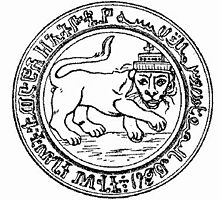Negus: Difference between revisions
No edit summary Tags: Visual edit Mobile edit Mobile web edit |
No edit summary Tags: Visual edit Mobile edit Mobile web edit |
||
| Line 3: | Line 3: | ||
{{Use dmy dates|date=October 2018}} |
{{Use dmy dates|date=October 2018}} |
||
[[File:Seal tewodros.jpg|thumb|Royal seal of Emperor [[Tewodros II]] (ንጉሥ)]] |
[[File:Seal tewodros.jpg|thumb|Royal seal of Emperor [[Tewodros II]] (ንጉሥ)]] |
||
'''Negus''' ({{lang-gez|ንጉሥ}}, ''{{transl|sem|nəgueś}}'' {{IPA-gez|nɨgueɬ|}}; cf. {{lang-ti|ነጋሲ}} ''{{transl|sem|negus}}'' {{IPA-ti|negus|}}) is a [[Ethiopian aristocratic and court titles|title]] in the [[Ethiopian Semitic languages]].<ref>{{cite book |title=Haile Selassie, Western Education, and Political Revolution in Ethiopia |url=https://books.google.com/books?id=YbtcTwtUWrwC&q=Haile+Selassie,+western+education,+and+political |publisher=Cambria Press |isbn=9781621969143}}</ref> It denotes a [[monarch]],<ref>[http://www.merriam-webster.com/dictionary/negus Negus. Amharic nəgus, from Geez nĕgūša nagašt king of kings. First Known Use: 1594] Merriam Webster dictionary</ref> such as the |
'''Negus''' ({{lang-gez|ንጉሥ}}, ''{{transl|sem|nəgueś}}'' {{IPA-gez|nɨgueɬ|}}; cf. {{lang-ti|ነጋሲ}} ''{{transl|sem|negus}}'' {{IPA-ti|negus|}}) is a [[Ethiopian aristocratic and court titles|title]] in the [[Ethiopian Semitic languages]].<ref>{{cite book |title=Haile Selassie, Western Education, and Political Revolution in Ethiopia |url=https://books.google.com/books?id=YbtcTwtUWrwC&q=Haile+Selassie,+western+education,+and+political |publisher=Cambria Press |isbn=9781621969143}}</ref> It denotes a [[monarch]],<ref>[http://www.merriam-webster.com/dictionary/negus Negus. Amharic nəgus, from Geez nĕgūša nagašt king of kings. First Known Use: 1594] Merriam Webster dictionary</ref> such as the Negus bahri (king of the sea) of the [[Medri Bahri]] kingdom in pre-1890 [[Eritrea]], and the negus in pre-1974 [[Ethiopia]]. The negus is referred to as An-Najashi (النجاشي) in the Islamic tradition. |
||
==Overview== |
==Overview== |
||
Revision as of 22:29, 12 April 2021

Negus (Template:Lang-gez, nəgueś Template:IPA-gez; cf. Template:Lang-ti negus Template:IPA-ti) is a title in the Ethiopian Semitic languages.[1] It denotes a monarch,[2] such as the Negus bahri (king of the sea) of the Medri Bahri kingdom in pre-1890 Eritrea, and the negus in pre-1974 Ethiopia. The negus is referred to as An-Najashi (النجاشي) in the Islamic tradition.
Overview
Negus is a noun derived from the Ethiopian Semitic root ngś, meaning "to reign". The title has subsequently been used to translate the word "king" or "emperor" in Biblical and other literature. In more recent times, it was used as an honorific title bestowed on governors of the most important provinces (kingdoms): Gojjam, Begemder, Wollo, Tigray and the seaward kingdom (where the variation Bahri Negasi "King of the Sea", was the ancient title of the ruler of present-day central Eritrea) and later Shewa.[3][4]
See also
References
- ^ Haile Selassie, Western Education, and Political Revolution in Ethiopia. Cambria Press. ISBN 9781621969143.
- ^ Negus. Amharic nəgus, from Geez nĕgūša nagašt king of kings. First Known Use: 1594 Merriam Webster dictionary
- ^ Mussie Tesfagiorgis G. Ph.D. (29 October 2010). Eritrea. ABC-CLIO. pp. 34–35. ISBN 978-1-59884-232-6.
- ^ Alemseged Abbay (1998). Identity Jilted, Or, Re-imagining Identity?: The Divergent Paths of the Eritrean and Tigrayan Nationalist Struggles. The Red Sea Press. p. 202. ISBN 978-1-56902-072-2.
